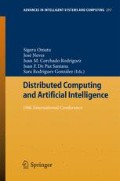Abstract
Disasters like terrorist attacks, earthquakes, hurricanes, and volcano eruptions are usually unpredictable events that affect a high number of people. We propose an approach that can be used as a decision support tool for a post-disaster response that allows the assignment of victims to hospitals and organizes their transportation via emergency vehicles. Exploiting Operational Research and Constraint Programming techniques we are able to compute assignments and schedules of vehicles that save more victims than heuristic based approaches.
Access this chapter
Tax calculation will be finalised at checkout
Purchases are for personal use only
Preview
Unable to display preview. Download preview PDF.
References
GeoFES website, http://www.dhigroup.com/MIKECUSTOMISEDbyDHI/GeoFES.aspx
Odyssey website, http://www.plain.co.uk/index.php?option=com_content&task=view&id=67&Itemid=98
Altay, N., Green, W.G.: OR/MS research in disaster operations management. EJOR 175(1), 475–493 (2006)
Andersson, T., Petersson, S., Värbrand, P.: Decision Support for Efficient Ambulance Logistics. Department of Science and Technology (ITN), Linköping University (2005)
Chu, T.-Q., Drogoul, A., Boucher, A., Zucker, J.-D.: Interactive Learning of Independent Experts’ Criteria for Rescue Simulations. J. UCS 15(13), 2701–2725 (2009)
Erdogan, G., Erkut, E., Ingolfsson, A., Laporte, G.: Scheduling ambulance crews for maximum coverage. JORS 61(4), 543–550 (2010)
Issam, N., Jean-Christophe, N., Jolly, D.: Reactive Operating Schedule in Case of a Disaster: Arrival of Unexpected Victims. In: WCE, pp. 2123–2128 (2010)
Lopez, B., Innocenti, B., Busquets, D.: A Multiagent System for Coordinating Ambulances for Emergency Medical Services. Intelligent Systems 23(5), 50–57 (2008)
Moreno, A., Valls, A., Bocio, J.: Management of Hospital Teams for Organ Transplants Using Multi-agent Systems. In: Quaglini, S., Barahona, P., Andreassen, S. (eds.) AIME 2001. LNCS (LNAI), vol. 2101, pp. 374–383. Springer, Heidelberg (2001)
Narzisi, G., Mysore, V., Mishra, B.: Multi-Objective Evolutionary Optimization of Agent Based Models: an application to emergency response planning. In: Computational Intelligence, pp. 228–232 (2006)
Nordin, N., Kadir, N., Zaharudin, Z., Nordin, N.: An application of the A* algorithm on the ambulance routing. In: CHUSER, pp. 855–859 (2011)
Paquet, S., Bernier, N., Chaib-Draa, B.: Multiagent Systems Viewed as Distributed Scheduling Systems: Methodology and Experiments. In: AI, pp. 43–47 (2005)
Suárez, S.A., Quintero, C.G., de la Rosa, J.L.: A Real Time Approach for Task Allocation in a Disaster Scenario. In: PAAMS, pp. 157–162 (2010)
Teruhiro, M., Weihua, S., Keiichi, Y., Minoru, I.: Transportation Scheduling Method for Patients in MCI using Electronic Triage Tag. In: eTELEMED, pp. 1–7 (2011)
Tufekci, S., Wallace, W.: The Emerging Area of Emergency Management And Engineering. Engineering Management 45(2), 103–105 (1998)
Ufuk, K., Ozden, T., Saniye, T.: Emergency Vehicle Routing in Disaster Response Operations. In: POMS (2012)
Author information
Authors and Affiliations
Corresponding author
Editor information
Editors and Affiliations
Rights and permissions
Copyright information
© 2013 Springer International Publishing Switzerland
About this paper
Cite this paper
Amadini, R., Sefrioui, I., Mauro, J., Gabbrielli, M. (2013). Fast Post-Disaster Emergency Vehicle Scheduling. In: Omatu, S., Neves, J., Rodriguez, J., Paz Santana, J., Gonzalez, S. (eds) Distributed Computing and Artificial Intelligence. Advances in Intelligent Systems and Computing, vol 217. Springer, Cham. https://doi.org/10.1007/978-3-319-00551-5_27
Download citation
DOI: https://doi.org/10.1007/978-3-319-00551-5_27
Publisher Name: Springer, Cham
Print ISBN: 978-3-319-00550-8
Online ISBN: 978-3-319-00551-5
eBook Packages: EngineeringEngineering (R0)

